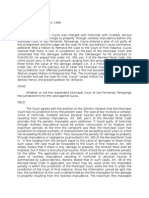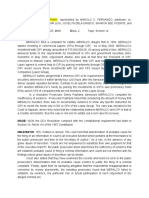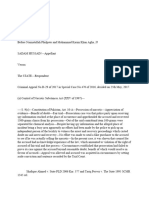People v. Ma. Theresa Pangilinan
People v. Ma. Theresa Pangilinan
Uploaded by
Vanessa C. RoaCopyright:
Available Formats
People v. Ma. Theresa Pangilinan
People v. Ma. Theresa Pangilinan
Uploaded by
Vanessa C. RoaOriginal Description:
Copyright
Available Formats
Share this document
Did you find this document useful?
Is this content inappropriate?
Copyright:
Available Formats
People v. Ma. Theresa Pangilinan
People v. Ma. Theresa Pangilinan
Uploaded by
Vanessa C. RoaCopyright:
Available Formats
PEOPLE V. MA.
THERESA PANGILINAN
G.R. No. 152662, June 13, 2012
Perez, J:
FACTS:
On 16 September 1997, Virginia C. Malolos filed an affidavit-complaint for estafa and violation of
Batas Pambansa (BP) Blg. 22 against Ma. Theresa Pangilinan (respondent) with the Office of the
City Prosecutor of Quezon City. The complaint alleges that respondent issued nine (9) checks
with an aggregate amount of Nine Million Six Hundred Fifty-Eight Thousand Five Hundred Ninety-
Two Pesos (P9,658,592.00) in favor of private complainant which were dishonored upon
presentment for payment.
Consequently the case was modified, and only on February 3, 2000 that two counts for violation
of BP Blg. 22 were filed against respondent Ma.Theresa Pangilinan in the Metropolitan Trial Court
of Quezon City. On 17 June 2000, respondent filed an “Omnibus Motion to Quash the
Information and to Defer the Issuance of Warrant of Arrest” before MeTC, Branch 31, Quezon
City. She alleged that her criminal liability has been extinguished by reason of prescription.
In defense of her claim, Pangilinan said that the prevailing law that governs the prescription of
special penal law, B.P. 22, is Section 2 of Act No. 3326 (An Act To Establish Periods Of
Prescription For Violations Penalized By Special Acts) where the right to file an action to a
“proper court” and not to merely to prosecution office for B.P. 22, prescribes four (4) years from
the commission of the crime. The imputed violation occurred sometime in 1995, and only on
February 3, 2000 that a case was formally filed in the Metropolitan Trial Court, therefore the
action already prescribes. RTC granted the motion.
On the other hand, the complainant argued that the filing with the office of city prosecutor
constitutes an interruption to the prescription.
ISSUE:
Is filing complaint to city prosecutor office considered a “judicial proceeding” that can interrupt
prescription of crime under B.P. 22?
HELD:
YES. Following a catena of cases, the court held that, there is no more distinction between cases
under the Revised Penal Code (RPC) and those covered by special laws with respect to the
interruption of the period of prescription; that the institution of proceedings for preliminary
investigation in the office of prosecutor against accused interrupts the period of prescription.
Following the factual finding the crime was committed sometime in 1995, the filing of complaint on
September 1997, two (2) years from the commission of the crime validly interrupts the running of
prescription. Therefore the action against the respondent Pangilinan did not prescribe.
You might also like
- Crim Pro For RecitDocument22 pagesCrim Pro For RecitMarco RenaciaNo ratings yet
- People v. PangilinanDocument2 pagesPeople v. Pangilinanvallie21No ratings yet
- Tampus - Cheng vs. Sps. Sy - Rule 111Document2 pagesTampus - Cheng vs. Sps. Sy - Rule 111Ermeline TampusNo ratings yet
- Done - 10. Cudia v. CADocument2 pagesDone - 10. Cudia v. CAsophiaNo ratings yet
- Metropolitan Bank and Trust Company vs. Reynaldo and Adrandea, G.R. No. 164538 August 9, 2010Document12 pagesMetropolitan Bank and Trust Company vs. Reynaldo and Adrandea, G.R. No. 164538 August 9, 2010Jass ElardoNo ratings yet
- Criminal Law: Answers To Bar Examination Questions inDocument170 pagesCriminal Law: Answers To Bar Examination Questions inJohannah Paola Peches ZipaganNo ratings yet
- Administrative Circular No 09-94Document2 pagesAdministrative Circular No 09-94Angie Cureg-TolentinoNo ratings yet
- People vs. Romualdez G.R. NO. 166510 - April 29, 2004Document2 pagesPeople vs. Romualdez G.R. NO. 166510 - April 29, 2004MC100% (2)
- Atty. Plaridel C. Nava II, Complainant, vs. Prosecutor Ofelia M. D. ArtuzDocument2 pagesAtty. Plaridel C. Nava II, Complainant, vs. Prosecutor Ofelia M. D. ArtuzRay John Uy-Maldecer AgregadoNo ratings yet
- Arambulo vs. LaquiDocument6 pagesArambulo vs. LaquiWillow SapphireNo ratings yet
- Estipona JR V Hon. LobrigoDocument15 pagesEstipona JR V Hon. LobrigoroyalwhoNo ratings yet
- 2 - Haron S. MelingDocument3 pages2 - Haron S. MelingcloudNo ratings yet
- Morillo V People (G.r. No. 198270, December 9, 2015)Document1 pageMorillo V People (G.r. No. 198270, December 9, 2015)Anne Kerstine BastinenNo ratings yet
- Criminal Case DigestDocument519 pagesCriminal Case DigestRhic Ryanlhee Vergara Fabs100% (2)
- CHING AND POWING PROPERTIES V JOSEPH CHENGDocument6 pagesCHING AND POWING PROPERTIES V JOSEPH CHENGJulia UnarceNo ratings yet
- Remedial Law Goopio Vs MaglalangDocument2 pagesRemedial Law Goopio Vs MaglalangHanna Mae MataNo ratings yet
- Criminal Law Case DigestDocument90 pagesCriminal Law Case DigestJotmu Solis100% (1)
- People v. Amaca / GR No. 110129 / August 12, 1997Document2 pagesPeople v. Amaca / GR No. 110129 / August 12, 1997Mini U. SorianoNo ratings yet
- Assignment Stat ConDocument18 pagesAssignment Stat ConPatricia QuitorianoNo ratings yet
- Digest Part 1 ObliconDocument9 pagesDigest Part 1 ObliconFncsixteen UstNo ratings yet
- Yujuico Vs Republic DigestDocument4 pagesYujuico Vs Republic DigestPrincess Loyola TapiaNo ratings yet
- Case Digest Rem 2Document53 pagesCase Digest Rem 2Cza PeñaNo ratings yet
- Borromeo Vs SunDocument7 pagesBorromeo Vs SunLee SomarNo ratings yet
- Topic Date Case Title GR No Doctrine: Criminal Procedure 2EDocument4 pagesTopic Date Case Title GR No Doctrine: Criminal Procedure 2EJasenNo ratings yet
- 4 Carungcong vs. People Case DigestDocument20 pages4 Carungcong vs. People Case DigestEFGNo ratings yet
- Atienza Vs PPDocument2 pagesAtienza Vs PPNic Nalpen100% (1)
- Sun Insurance vs. AsuncionDocument3 pagesSun Insurance vs. AsuncionLolit CarlosNo ratings yet
- Hacienda Bigaa Vs Chavez 2Document5 pagesHacienda Bigaa Vs Chavez 2Christine ErnoNo ratings yet
- CRIMPRO Syllabus-2019Document14 pagesCRIMPRO Syllabus-2019millicentjhadeNo ratings yet
- Facts:: AC-5365 April 27, 2005 Spouses Franklin and Lourdes Olbes vs. Atty. Victor V. Deciembre Panganiban, J.Document1 pageFacts:: AC-5365 April 27, 2005 Spouses Franklin and Lourdes Olbes vs. Atty. Victor V. Deciembre Panganiban, J.JD DXNo ratings yet
- 5 Oporto v. Monserate (Cuevas) - Converted (With Watermark) B2021 PDFDocument2 pages5 Oporto v. Monserate (Cuevas) - Converted (With Watermark) B2021 PDFAbegail GaledoNo ratings yet
- G R - No - 157547Document1 pageG R - No - 157547Noel Christopher G. BellezaNo ratings yet
- Cuyos v. Garcia - CrimproDocument2 pagesCuyos v. Garcia - Crimprokaren igana100% (1)
- Crim Pro Case ListDocument3 pagesCrim Pro Case ListRAY RAMIREZNo ratings yet
- Valderrama Vs PeopleDocument14 pagesValderrama Vs PeopleCyrill BonosNo ratings yet
- Larranaga Vs CADocument5 pagesLarranaga Vs CASachuzenNo ratings yet
- Case To Digest Legal EthicsDocument1 pageCase To Digest Legal EthicsRoberto Rivero IIINo ratings yet
- Crimpro DigestDocument41 pagesCrimpro Digestwashburnx20No ratings yet
- Res Ipsa DigestDocument4 pagesRes Ipsa DigestynaymariaNo ratings yet
- 4 - People V Moreno 127Document2 pages4 - People V Moreno 127AmberChanNo ratings yet
- Cases-By Atty. GacayanDocument372 pagesCases-By Atty. Gacayansamsam100% (1)
- DREAMWORK CONSTRUCTION, INC., Petitioner, vs. Cleofe S. Janiola and Hon. Arthur A. Famini, RespondentsDocument16 pagesDREAMWORK CONSTRUCTION, INC., Petitioner, vs. Cleofe S. Janiola and Hon. Arthur A. Famini, RespondentsJephthah CastilloNo ratings yet
- Rule 110 NotesDocument12 pagesRule 110 NotesMary Licel RegalaNo ratings yet
- 1 Zaldivia V ReyesDocument9 pages1 Zaldivia V ReyesRussell Marquez ManglicmotNo ratings yet
- Arwood Industries, Inc. vs. D.M. Consunji, Inc.Document3 pagesArwood Industries, Inc. vs. D.M. Consunji, Inc.phiaNo ratings yet
- Persons People V SchneckenburgerDocument1 pagePersons People V SchneckenburgerJay Carlo BagayasNo ratings yet
- 17 Laude Vs Judge Ginez JabaldeDocument2 pages17 Laude Vs Judge Ginez JabaldeSyed Almendras IINo ratings yet
- People Vs DegamoDocument3 pagesPeople Vs DegamoJomari CajulisNo ratings yet
- People vs. UgangDocument8 pagesPeople vs. UgangShilalah OpenianoNo ratings yet
- Digested - de Joya V The Jail Warden of Batangas, GR Nos. 159418-19, Dec 10, 2003Document1 pageDigested - de Joya V The Jail Warden of Batangas, GR Nos. 159418-19, Dec 10, 2003KemNo ratings yet
- 110.1.7 - People V Bali-BalitaDocument3 pages110.1.7 - People V Bali-BalitaGio AguilaNo ratings yet
- BATTON, Ivory Miles H. 2A - LLB: Herminia Cando V. Sps. Aurora Olazo and Claudio March 22, 2007 G.R. No. 160741 FactsDocument3 pagesBATTON, Ivory Miles H. 2A - LLB: Herminia Cando V. Sps. Aurora Olazo and Claudio March 22, 2007 G.R. No. 160741 FactsRollyn Dee De Marco PiocosNo ratings yet
- Ricarze Vs Court of AppealsDocument2 pagesRicarze Vs Court of AppealsGennard Michael Angelo Angeles100% (1)
- CPR Canons 16-20Document24 pagesCPR Canons 16-20SuiNo ratings yet
- BUEN - Legal ConceptsDocument3 pagesBUEN - Legal ConceptsJia FriasNo ratings yet
- 3 People Vs Puedan - 139576 - September 2, 2002 - JDocument9 pages3 People Vs Puedan - 139576 - September 2, 2002 - JAleine Leilanie OroNo ratings yet
- People v. Sayo y Reyes, G.R. No. 227704, (April 10, 2019)Document25 pagesPeople v. Sayo y Reyes, G.R. No. 227704, (April 10, 2019)Olga Pleños ManingoNo ratings yet
- Pp-Vs-PangilinanDocument1 pagePp-Vs-PangilinanVanessa Yvonne GurtizaNo ratings yet
- People vs. PangilinanDocument2 pagesPeople vs. Pangilinanfina_ong625990% (10)
- U.S. v. Sun Myung Moon 532 F.Supp. 1360 (1982)From EverandU.S. v. Sun Myung Moon 532 F.Supp. 1360 (1982)No ratings yet
- Nera V RimandoDocument1 pageNera V RimandoVanessa C. RoaNo ratings yet
- Nationality Theory Ngo Burca Vs RP DigestDocument1 pageNationality Theory Ngo Burca Vs RP DigestVanessa C. RoaNo ratings yet
- Jarillo V PeopleDocument2 pagesJarillo V PeopleVanessa C. RoaNo ratings yet
- People Vs PosadaDocument1 pagePeople Vs PosadaVanessa C. Roa100% (1)
- Joseph v. Bautista, G.R. No. L-41423Document2 pagesJoseph v. Bautista, G.R. No. L-41423Vanessa C. RoaNo ratings yet
- Collector of Internal Revenue Vs Campos Rueda Case DigestDocument1 pageCollector of Internal Revenue Vs Campos Rueda Case DigestVanessa C. Roa100% (5)
- People V LagonDocument1 pagePeople V LagonVanessa C. RoaNo ratings yet
- People V AmodiaDocument1 pagePeople V AmodiaVanessa C. RoaNo ratings yet
- Union Bank V PeopleDocument1 pageUnion Bank V PeopleVanessa C. RoaNo ratings yet
- Heirs of Ypon V. Ricaforte, G.R. No. 198680, July 8, 2013Document1 pageHeirs of Ypon V. Ricaforte, G.R. No. 198680, July 8, 2013Vanessa C. RoaNo ratings yet
- Santos-Concio V DOJDocument1 pageSantos-Concio V DOJVanessa C. RoaNo ratings yet
- Lazarte Vs SandiganbayanDocument1 pageLazarte Vs SandiganbayanVanessa C. RoaNo ratings yet
- Narciso V Romana-CruzDocument1 pageNarciso V Romana-CruzVanessa C. RoaNo ratings yet
- People V UmbreroDocument1 pagePeople V UmbreroVanessa C. RoaNo ratings yet
- PIlipinas Shell V RomarsDocument2 pagesPIlipinas Shell V RomarsVanessa C. RoaNo ratings yet
- San Miguel Properties V Huang Case DigestDocument2 pagesSan Miguel Properties V Huang Case DigestVanessa C. RoaNo ratings yet
- Ratio:: People of The Philippines vs. Feliciano (Digest)Document1 pageRatio:: People of The Philippines vs. Feliciano (Digest)Vanessa C. RoaNo ratings yet
- Alvizo V SandiganbayanDocument2 pagesAlvizo V SandiganbayanVanessa C. RoaNo ratings yet
- DBP v. RD of Nueva EcijaDocument4 pagesDBP v. RD of Nueva EcijaVanessa C. RoaNo ratings yet
- Romualdez Vs MarceloDocument2 pagesRomualdez Vs MarceloVanessa C. RoaNo ratings yet
- Death Under Exceptional Circumstancesparricide MurderDocument30 pagesDeath Under Exceptional Circumstancesparricide Murdergalilea ulayanNo ratings yet
- Efren C. Carag For Eduardo C. Arroyo, Jr. Singson, Valdes & Associates For Ruby Vera NeriDocument5 pagesEfren C. Carag For Eduardo C. Arroyo, Jr. Singson, Valdes & Associates For Ruby Vera NeriPinky De Castro AbarquezNo ratings yet
- First Division: Court of Tax AppealsDocument29 pagesFirst Division: Court of Tax AppealsKym Buena-RegadoNo ratings yet
- PP vs. LabagalaDocument11 pagesPP vs. LabagalaJohn Leo SolinapNo ratings yet
- Joaquin Vs DrilonDocument4 pagesJoaquin Vs DrilonJay Kent RoilesNo ratings yet
- Interviewing The Victim - Techniques Based On The Realistic Dynamics of Sexual AssaultDocument122 pagesInterviewing The Victim - Techniques Based On The Realistic Dynamics of Sexual AssaultMavraNo ratings yet
- People Vs BejimDocument14 pagesPeople Vs BejimPaul AriolaNo ratings yet
- Cabral vs. BracamonteDocument3 pagesCabral vs. BracamonteBeatrice Aban100% (1)
- United States v. John Pforzheimer, 826 F.2d 200, 2d Cir. (1987)Document10 pagesUnited States v. John Pforzheimer, 826 F.2d 200, 2d Cir. (1987)Scribd Government DocsNo ratings yet
- Case 15Document7 pagesCase 15Gillian Alexis ColegadoNo ratings yet
- U.S. vs. Gamao Digest and Full TextDocument2 pagesU.S. vs. Gamao Digest and Full TextAyban NabatarNo ratings yet
- Group 6 Moot Court Script 1Document30 pagesGroup 6 Moot Court Script 1Judilyn RavilasNo ratings yet
- Dionisio V EscanoDocument5 pagesDionisio V EscanoAtty. Glen JornalesNo ratings yet
- John Durham - Jury QuestionnaireDocument39 pagesJohn Durham - Jury QuestionnaireWashington ExaminerNo ratings yet
- People vs. CalpitoDocument2 pagesPeople vs. CalpitoAthina Maricar CabaseNo ratings yet
- PEOPLE Vs Manuel Beronilla096 Phil 566Document6 pagesPEOPLE Vs Manuel Beronilla096 Phil 566Gyan PascualNo ratings yet
- Jimenez vs. Atty. VeranoDocument11 pagesJimenez vs. Atty. VeranoMarga CastilloNo ratings yet
- 2013.11.13 Wendell Griffin ComplaintDocument22 pages2013.11.13 Wendell Griffin ComplaintEthan BrownNo ratings yet
- 2002 YLR 2117 - GHULAM QADIR Versus THE STATE - LAHORE HIGH COURT LAHOREDocument11 pages2002 YLR 2117 - GHULAM QADIR Versus THE STATE - LAHORE HIGH COURT LAHOREFarwan AkhtarNo ratings yet
- Shawn HatchettDocument7 pagesShawn Hatchettapi-483371921No ratings yet
- Complaint Affidavit Bp22 CaseDocument6 pagesComplaint Affidavit Bp22 CaseHaniyyah FtmNo ratings yet
- Memorial For ProsecutionDocument26 pagesMemorial For ProsecutionShubhamSauravNo ratings yet
- Due Process CasesDocument16 pagesDue Process Casesjury jason100% (1)
- Pen1501 Assignment 02Document6 pagesPen1501 Assignment 02xoliswa mandisa dlaminiNo ratings yet
- Case # 49 - People-vs-Dela-Cruz (Case Digest)Document4 pagesCase # 49 - People-vs-Dela-Cruz (Case Digest)Angelina Villaver ReojaNo ratings yet
- 03.09.16 News Star WEBDocument16 pages03.09.16 News Star WEBPeter DowellNo ratings yet
- Meralco V AtilanoDocument1 pageMeralco V AtilanoChristina AureNo ratings yet
- Batch 3Document64 pagesBatch 3cristine jagodillaNo ratings yet
- Right To Counsel-2018 M L D 1025Document8 pagesRight To Counsel-2018 M L D 1025simoncartmanbruhNo ratings yet
- Study Guide, ComelecDocument7 pagesStudy Guide, ComelecMariaNo ratings yet













































































































